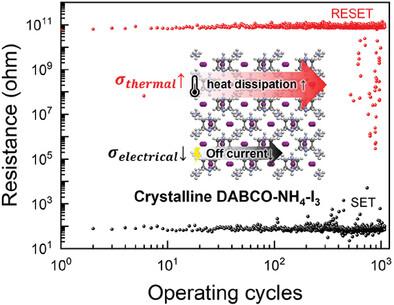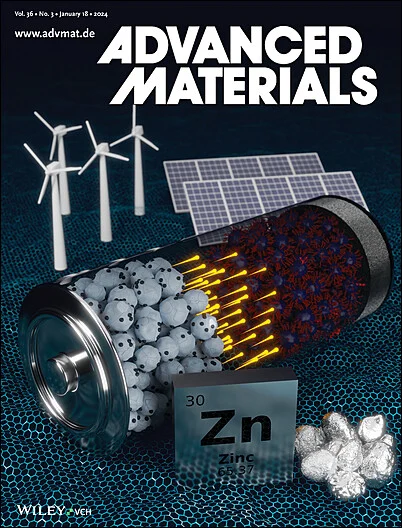High Thermal Conductive Crystalline Organohalide for Endurable Resistive Switching Non-Volatile Memory
IF 27.4
1区 材料科学
Q1 CHEMISTRY, MULTIDISCIPLINARY
引用次数: 0
Abstract
The organic-based memristive devices are widely studied as a next-generation electronics for eco-friendly wearable applications, thanks to materials` flexibility and biocompatibility. However, poor operational reliability and stability of the devices remain a critical challenge. Here, the study demonstrates a crystalline organohalide, Dabconium ammonium triiodide (DABCO-NH4-I3, DABCO is 1,4-diazabicyclo[2.2.2] octonium)-based memristive device with exceptionally high reliability and endurance. Owing to the low dielectric constant and anisotropic hexagonal crystal structure consisting of hydrogen bonds with a high bandgap, the DABCO-NH4-I3-based conductive bridging random access memory device demonstrates millivolt-scale operating voltages with a remarkably high on/off ratio of ≈109, capable of multi-level storage. The relatively higher thermal conductivity of the crystalline organohalide (1.06 W m−1K−1), compared to most of organic materials (0.1–0.5 W m−1K−1), is found to be beneficial to suppress intense heat accumulation generated by Joule heating effect during device operation. With the facilitated dissipation of the generated heat, the simple planar heterojunction structured device shows remarkably endurable resistive switching over 103 cycles of program-erase at both room temperature and 85 °C with high switching reliability. This study introduced a new class of materials that can overcome the limitations of existing organic materials for high-performance next-generation organic electronic devices.

用于耐久电阻式开关非易失性存储器的高导热结晶有机卤化物
由于材料具有柔韧性和生物相容性,基于有机材料的忆阻器件作为下一代电子器件被广泛研究,用于环保型可穿戴应用。然而,器件运行可靠性和稳定性差仍然是一个严峻的挑战。本研究展示了一种基于晶体有机卤化物、三碘化达布贡铵(DABCO-NH4-I3,DABCO 是 1,4-二氮杂双环[2.2.2] 辛铵)的忆阻器件,具有极高的可靠性和耐久性。由于 DABCO-NH4-I3 具有低介电常数和由高带隙氢键组成的各向异性六方晶体结构,因此基于 DABCO-NH4-I3 的导电桥接随机存取存储器件具有毫伏级的工作电压和≈109 的超高导通/关断比,能够进行多级存储。与大多数有机材料(0.1-0.5 W m-1K-1)相比,结晶有机卤化物的热导率相对较高(1.06 W m-1K-1),这有利于抑制器件工作时焦耳热效应产生的高热积聚。由于促进了所产生热量的散失,这种简单的平面异质结结构器件在室温和 85 ℃ 条件下,经过 103 次编程-擦除循环,显示出显著的持久电阻开关性能和高开关可靠性。这项研究引入了一类新材料,可以克服现有有机材料的局限性,实现高性能的下一代有机电子器件。
本文章由计算机程序翻译,如有差异,请以英文原文为准。
求助全文
约1分钟内获得全文
求助全文
来源期刊

Advanced Materials
工程技术-材料科学:综合
CiteScore
43.00
自引率
4.10%
发文量
2182
审稿时长
2 months
期刊介绍:
Advanced Materials, one of the world's most prestigious journals and the foundation of the Advanced portfolio, is the home of choice for best-in-class materials science for more than 30 years. Following this fast-growing and interdisciplinary field, we are considering and publishing the most important discoveries on any and all materials from materials scientists, chemists, physicists, engineers as well as health and life scientists and bringing you the latest results and trends in modern materials-related research every week.
 求助内容:
求助内容: 应助结果提醒方式:
应助结果提醒方式:


